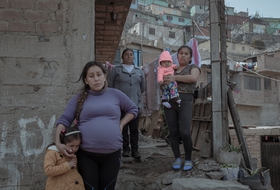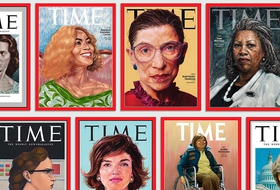
One in three women have suffered physical or sexual violence. With contributions from Europe, Africa, Asia and Latin America, we look at how this shadow pandemic affects every corner of the world.
Seemingly positive news is going to shake the history of the country where women have the least rights in the world and that of the entire Islamic world. Saudi Arabia will allow women to vote and run in municipal elections. The news has been released by local media in conjunction with the start of the
Seemingly positive news is going to shake the history of the country where women have the least rights in the world and that of the entire Islamic world. Saudi Arabia will allow women to vote and run in municipal elections. The news has been released by local media in conjunction with the start of the possibility to register to vote, starting from 22 August, in December elections.
Saudi Arabia is an Islamic-moulded absolute monarchy. In 2011 King Abdullah, who passed away in January and was one of the most progressive characters the country ever had, emitted an order to grant women to participate in the kingdom’s politics, raising unrest within the community. Despite this open-mindedness, the situation remains terrible. To date, women are not allowed to freely travel, work or go to school, nor own a bank account without previous men’s authorisation. Women can’t even drive cars. A situation that comes from a strict Salafi interpretation of Sunni Islam.
Alongside register to vote, women are also allowed to register as candidates starting from 30 August. According to some sources, there are 70 women willing to candidate. Most of them come from the economic world, but many others are committed at social and local levels. Moreover, there are other 80 women willing to register as managers to coordinate campaigns.
#Saudi women can finally vote in municipal elections, but this is only first step toward full equality https://t.co/8iEr0Cgn6I @cooglea @hrw
— Samer Muscati (@SamerHRW) 20 Agosto 2015
“While it’s a sign of progress, allowing women to stand and vote in elections (and then only municipal elections) is not enough to secure women’s full integration into Saudi public life,” wrote Adam Coogle, Middle East researcher for the US non-governmental organisation Human Rights Watch. The NGO Amnesty International is even more sceptical, claiming there is nothing to celebrate, since it represents an overdue fact, which hasn’t been followed by new reforms, since the current situation is anything but favourable due to conservatives.
Siamo anche su WhatsApp. Segui il canale ufficiale LifeGate per restare aggiornata, aggiornato sulle ultime notizie e sulle nostre attività.
![]()
Quest'opera è distribuita con Licenza Creative Commons Attribuzione - Non commerciale - Non opere derivate 4.0 Internazionale.
One in three women have suffered physical or sexual violence. With contributions from Europe, Africa, Asia and Latin America, we look at how this shadow pandemic affects every corner of the world.
The Istanbul Convention against gender-based and domestic violence marks its tenth anniversary. We look at what it is, who its signatories are, and what the future might hold.
European Commission President Ursula von der Leyen reminded us of the gravity of violence against women around the world, and of the Istanbul Convention’s utmost importance.
President Erdoğan has pulled Turkey out of the Istanbul Convention, key in the fight against gender violence, claiming that it favours the LGBT community rather than family values.
Violence against women in Peru has increased as a result of Covid-19 lockdowns. 14,912 people were reported missing from January to November 2020, more than half of them minors and 64 per cent women. People have been confined to their homes for months, many forced to endure poor physical, economic and social conditions. A situation that
Joys Estefani Qqueccaño Huamani, 24, disappeared from her rural community in Peru on 9 October. Her family began looking for her independently of the authorities and despite the resistance of relatives of Joys Estefani’s ex-partner Arturo Ccana Condori, 32, charged with committing violence against her on 28 September, eleven days before Joys Estefani disappeared. Photos
Costa Rica celebrated its first same-sex marriage when two women, Alexandra Quiros and Dunia Araya, celebrated their wedding: an “extraordinary moment”.
The pandemic and its restrictions are affecting everyone, without exceptions. However factors like housing, income inequalities, gender, access to technology and working conditions are influencing how people experience the health crisis.
Time magazine’s 100 Women of the Year project sheds light on influential women’s stories, from Amelia Earhart to Greta Thunberg. A selection of some of the greats for International Women’s Day.







